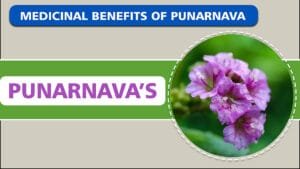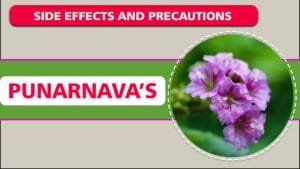Punarnava (Boerhavia diffuse), commonly known as “spreading hogweed” or “Red Hogweed,” is a significant herb in traditional Indian medicine, particularly in Ayurveda, where it has earned the reputation of a powerful rejuvenating plant. The name “Punarnava” comes from the Sanskrit words “Punar,” meaning “again,” and “Nava,” meaning “new,” symbolizing its capacity to renew and restore the body’s vitality. Native to tropical and subtropical regions of India, Africa, and Southeast Asia, Punarnava is a hardy, fast-growing plant found in areas with warm climates. Its roots stems, and leaves are all utilized in various therapeutic forms, and its diverse range of health benefits has earned it a place in modern herbal medicine.
Thank you for reading this post, don't forget to subscribe!Phytochemical Composition of Punarnava
It is rich in bioactive compounds, which contribute to its wide array of medicinal properties. The plant contains alkaloids, flavonoids, saponins, terpenoids, phenolic compounds, and various antioxidants, all of which are crucial to its healing effects. The roots and leaves of the plant are the most frequently used parts in herbal formulations, as they house the highest concentration of these bioactive constituents. The key components of Punarnava include:
- Alkaloids: Compounds such as boeravinone, punarnavine, and punarnavoside are found in Punarnava, contributing to its ability to rejuvenate the body, enhance the immune system, and act as a natural diuretic.
- Flavonoids: These compounds are potent antioxidants and play a significant role in reducing oxidative stress in the body. Flavonoids in Punarnava are thought to protect against cell damage and premature aging, support cardiovascular health, and possess anti-inflammatory properties.
- Saponins: Known for their immune-boosting and anti-inflammatory effects, saponins in It’s also contribute to its ability to fight infections and improve digestive health.
- Phenolic Compounds: These compounds also possess antioxidant properties, supporting the body’s defense mechanisms against free radicals, which are responsible for tissue damage and various chronic diseases.
Punarnava’s Role in Traditional Medicine

In traditional medicine, particularly in Ayurveda, Punarnava is considered an indispensable herb for maintaining balance in the body. The herb is classified as a “Rasayana,” a category of substances that are believed to promote rejuvenation and vitality. Ayurvedic practitioners have long used It’s treat a variety of ailments, from kidney disorders to joint pain and digestive issues.
It is also known for its “Tridoshic” properties, meaning it can balance all three doshas (Vata, Pitta, and Kapha). It is often recommended for individuals with imbalances in the body, especially those experiencing excess fluid retention, inflammation, or digestive disturbances.
Medicinal Benefits of Punarnava

- Kidney and Urinary Health
One of the most renowned uses of Punarnava is for supporting kidney and urinary tract health. It acts as a natural diuretic, promoting the elimination of excess fluids from the body, which can help alleviate conditions such as water retention, bloating, and kidney stones. It is believed to help in cleansing the kidneys by flushing out toxins and preventing the formation of kidney stones. Punarnava’s role in improving renal function is particularly helpful for individuals suffering from kidney diseases like nephritis or nephrotic syndrome.- Kidney Stones: It helps to prevent the accumulation of minerals and salts that can form kidney stones. The herb is also believed to aid in breaking down small stones and flushing them out through increased urine flow.
- Urinary Tract Infections (UTIs): Its antibacterial and antimicrobial properties make it effective in treating urinary tract infections and reducing pain and inflammation associated with these conditions.
- Anti-inflammatory and Antioxidant Properties
It has significant anti-inflammatory effects, making it highly effective in treating conditions related to inflammation, such as arthritis, gout, and inflammatory bowel disease. The herb’s active compounds inhibit the production of inflammatory mediators, reducing pain and swelling in joints and tissues.- Arthritis: Punarnava is often used to relieve symptoms of joint pain, swelling, and stiffness. Its anti-inflammatory compounds can help reduce the frequency and severity of arthritis flare-ups.
- Gout: Punarnava can assist in reducing uric acid levels in the body, which is beneficial for individuals suffering from gout, a condition characterized by painful joint inflammation due to the accumulation of uric acid crystals.
- Liver Health and Detoxification
Punarnava is highly valued for its liver-protective properties. It aids in detoxifying the liver, enhancing its ability to metabolize fats and eliminate waste products. This is particularly beneficial for individuals dealing with liver diseases such as hepatitis, fatty liver, or cirrhosis. Regular consumption of It can help regenerate liver cells and improve overall liver function.- Hepatitis and Fatty Liver: Punarnava is known to help reduce liver inflammation, promote liver cell regeneration, and enhance bile production. It helps improve liver enzyme levels, which are often elevated in liver conditions.
- Digestive Health
It’s plays a crucial role in promoting healthy digestion. It aids in the proper absorption of nutrients and supports the smooth functioning of the gastrointestinal system. It can be used to relieve constipation, indigestion, and bloating due to its mild laxative effect.- Detoxification: As a mild cleanser, It’s helps flush out toxins from the digestive system, improving digestion and overall gut health.
- Stomach Disorders: Punarnava is often used to treat ailments like dyspepsia, acidity, and gastritis, as it helps balance the stomach’s acidic content and soothes the gastrointestinal lining.
- Cardiovascular Health
It has been shown to have positive effects on heart health by lowering blood pressure, improving circulation, and maintaining a healthy cholesterol level. It supports the functioning of the cardiovascular system and prevents the development of cardiovascular diseases. By enhancing circulation and reducing blood vessel inflammation, It’s helps reduce the risk of heart attacks and strokes.
- Weight Management and Detoxification
Punarnava’s diuretic properties make it an excellent herb for weight management, as it helps reduce water retention, bloating, and body fat. Additionally, it is known to improve metabolism and promote healthy digestion, contributing to weight loss and maintenance of a lean physique. The herb helps cleanse the body of excess fluids and waste, promoting a natural detoxification process.
- Antibacterial and Antifungal Effects
Punarnava has potent antibacterial and antifungal properties that can help treat infections in various parts of the body, especially in the respiratory and digestive systems. It is used to combat symptoms of the common cold, cough, and sore throat. Its antifungal properties also make it effective in treating skin conditions like ringworm and athlete’s foot.
- Immune System Support
Due to its antioxidant, anti-inflammatory, and antimicrobial properties, Punarnava plays a significant role in boosting the immune system. It enhances the body’s ability to fight off infections, reduce inflammation, and promote overall health.
How to Use Punarnava
Punarnava can be consumed in several forms, depending on the specific health need and preference. Common forms of consumption include:
- Powder: Punarnava powder is one of the most common forms. It can be mixed with water, milk, or honey and consumed regularly for general wellness or targeted treatments.
- Capsules: Punarnava is available in capsule form for easy consumption. This form is convenient for individuals seeking to integrate it into their daily routine.
- Tinctures: Punarnava tinctures are concentrated extracts of the herb and are used for quick absorption.
- Decoction: Punarnava roots can be boiled in water to make a decoction, which can be consumed to treat specific conditions like kidney stones or inflammation.
Side Effects and Precautions

Punarnava is generally safe when consumed in recommended doses. However, excessive use may lead to dehydration, electrolyte imbalances, or digestive disturbances. Pregnant and breastfeeding women should consult a healthcare professional before using Punarnava, as it may have diuretic effects. People with existing kidney or heart conditions should also exercise caution and consult with a doctor before using Punarnava.
Conclusion
Punarnava is a powerful herb with a wide range of health benefits, from promoting kidney and liver health to supporting digestion, weight management, and immune function. Its potent anti-inflammatory, antioxidant, and diuretic properties make it an essential herb in both traditional and modern herbal medicine. Whether used to manage chronic health conditions or as a general tonic to improve overall vitality, Punarnava stands as a versatile herb that supports holistic well-being. By incorporating Punarnava into one’s health regimen, individuals can experience the rejuvenating effects of this ancient herb and enjoy enhanced health and vitality.

